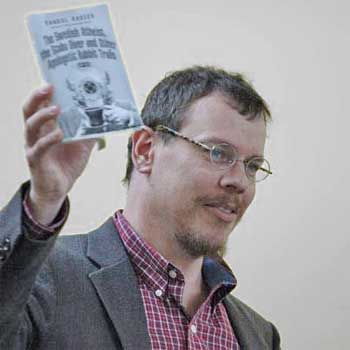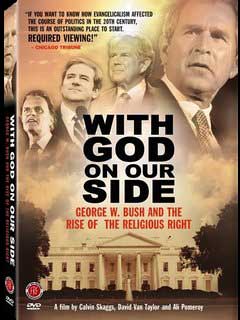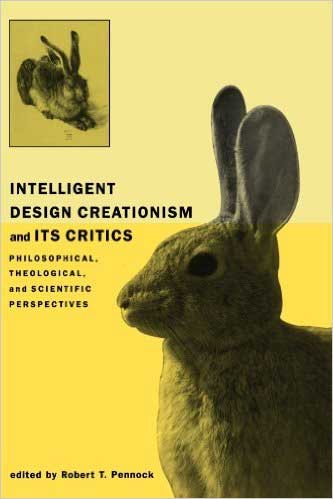 Randal Rauser |
Randal, Thanks for your kind words here concerning something I wrote. You think I am a “great storyteller?” I think ancient Hebrews were “great storytellers” and I suspect you agree with me there, especially concerning the primeval history section of Genesis from the six-day creation to the Garden of Eden, Flood, and Tower of Babel stories.
Two items to clear up before proceeding further:
Please call me “Ed,” rather than “Dr. Babinski.” I do not hold a doctorate only a bachelorʼs in biology.
I am not an “atheist.” I am a former born again Christian who experienced what some call “charismatic/Pentecostal” phenomena, such as the “baptism in the Holy Spirit” and “speaking in tongues,” see here. As a Christian I was very interested in apologetics and a big fan of the Inklings (C. S. Lewis, Charles Williams, Tolkien), George MacDonald, G. K. Chesterton, Francis Schaeffer, InterVarsity Press authors who wrote works on apologetics, and, Josh McDowell. After leaving the fold I was invited to reply to McDowellʼs claim that the Christian experience was “unique,” and did so here. Today, I am an agnostic who hopes for an afterlife (that is, if a God or some sort of cosmic consciousness exists).
I edited a book, Leaving the Fold: Testimonies of Former Fundamentalists, click here, that includes testimonies of people who left conservative Christianity for more moderate pastures, or liberal pastures, or who became adherents of other religions, or agnostics, or atheists. I also wrote a chapter on “The Cosmology of the Bible,” click here, and click here to read some of the replies the chapter received, as well as counter-replies by my atheist friend Ben.
|
|
Randal, Your Comments to Me From Your Blog Appear Below, Followed by My Responses Which Are Indented
Ed, youʼre a great story teller. Your Achillesʼ heal is in moving from story telling to formal argument. How do you move from “This is the ‘natural history’ of human origins and the human place in the universe” to “Therefore, there is no God”?
Randal, Itʼs “heel,” not “heal.” And your own Achilleʼs heel consists in missing my point that stories raise questions, and questions precede formal arguments. Nor do formal arguments have any advantage over informal ones as told in stories, not when it comes to the crucial matter of basic intuitions--the same basic intuitions that constitute the demarcation lines where even formal arguments either convince or fail to do so.
I did not declare, “There is no God.” Nor is there any need to do so. My point was that before any debate begins there are points about the cosmos we may agree on, points based on scientific investigation, points that are unsettling and that even make a Divine Tinkerer Hypotheses appear as likely as a Divine Designer Hypothesis.
In fact, knowing the cosmic story and humanityʼs place in it is a necessary precursor to arguing formally about it. I would like us to begin by agreeing that the cosmos has a story, see The Great Story site here, or see The Big History Project here.
Daily life for most involves long stretches of repetitive events that have minimal emotional, philosophical, or religious impact. It is in between such long stretches that the high drama takes place like being born/dying, getting wed/divorced, graduating/dropping out, getting hired/fired, holiday cheers/jeers, sporting event cheers/jeers, days of grand beauty/days of natural disasters, wonderful health/catastrophic illness, or, changes in oneʼs world view. A story can compress into a few hours the peak events in a personʼs life, the lives of a generation, a country, empire, planet or galaxy.
Stories let us see through other peopleʼs eyes the ways humans affect one another and the ways nature affects us. Stories are how we learn about the world and others.
The story I shared with you is that we live in a cosmos where life is in equilibrium with death, in which living organisms arise on infinitesimally small quaking planets that orbit stars that emit dangerous solar flares, all of which lay in the asteroid-strewn and radiation-filled vacuum of space. And life arises at the expense of high mortality rates of the young per each generation, such as the enormous percentages of dying zygotes and dying young of all species, not to mention mass extinction events. See my comments here on mortality rates, extinction events, and the questions they raise for the Intelligent Design hypothesis. Nor are those the only questions that a study of science raises, there are questions concerning how efficiently and/or beneficently the cosmos was “designed,” click here for examples. Astronomers have mapped out the lifetimes of stars depending on their mass and numerous corroborating stellar observations, and determined that stars are born and die (our own sun is a second-generation star, made partly from the exploded remains of a supernova whose explosion forged the heavier elements found on our planet). And our star, following the lifetime of others of similar size and mass, will one day expand in size to a red giant and burn up the earth long before the cosmos as a whole comes to an end. Though before our sun expands to become a red giant the Andromeda galaxy is due to collide with our own Milky Way galaxy since they are on a collision course -- but Iʼm speaking about a billion years from now. (Speaking of which “heat death” is no longer the only option as to how the cosmos will end, see here -- the leading hypothesis is the Big Rip in which time and space continue to expand at the current rate of measured acceleration till they rip apart at the edges like a balloon pumped with too much air or a Hippo leaping into a pair of size 12 khakis.
Scientific knowledge in areas as diverse as physics, astronomy, chemistry, geology and biology continues to expand like the surface area of a balloon being pumped each year with greater knowledge and inter-disciplinary research is common. But is that what we see in the religious world where adherents of rival religions, denominations, sects, and offshoots abound? Even focusing on Christianity alone, do Christians exhibit as much unity throughout their history as one might expect given the list of divine advantages that they claim they alone possess? Christians claim they possess
- the worldʼs only truly divinely inspired writings,
- the Holy Spirit guiding them into truth, and,
- the personal gift of special divine grace.
Scientists make no claim to such supernatural advantages. But Christians do claim such advantages, yet Christianity consists of divisions too numerous to mention and Christians remain the greatest debunkers of the views of other Christians, including todayʼs rival interpretations of the authority of the Bible, rival views concerning a wide range of theological questions and divisions still unsettled, rival views of spiritual or sacramental authority, sanctification, purity, divine commands and laws. To see some recent examples in print click here. As someone told me, “The ‘no-true-Christian-would-do-or-believe-XYZ” game is one of the more popular among, well, Christians.”
Put another way, religious believers remain convinced on the basis of
personal or internal experiences that are not shared by (or remain invisible to) those of other religions, and,
holy doctrines, dogmas and sacraments that appear unfalsifiably true to the religious believer but not shared by those of other religions. Hence, in religion, “Blessed are those who did not see, yet believe”. But that doesnʼt do much for people of other religions who believe in theirʼs without seeing, and it does even less for people with questions. The cosmic questions are obvious, while questions pertaining to the diversity and rivalries of religions raise yet more questions and add more confusion. Nor do I have to claim that everyoneʼs personal or internal religious experiences are false in order to ask, How can God expect me/us/everyone to know what to make of the diversity of religious beliefs and stories? We are presented with a mixed bag of evidence here as well as in the case of what we see in the cosmos. But letʼs look at some personal experiences below to illustrate what I mean.
Amazing healings. (Craig S. Keenerʼs book on Miracles is top heavy with tales of Protestants and Pentecostals who say they have been miraculously healed, though it appears light on stories from Catholics [Marian and saintsʼ miracles], Muslims, Hindus, Buddhists, Native Americans, New Agers, Wiccans, Scientologists, Tribalists or Aborigines. It also does not discuss cases of spontaneous remission from terminal cancers that happen on a statistical basis, see here. Or, herbal and nutritional supplements claimed by some to be involved in their remissions. Yes people tell stories that involve amazing healings. One such tale comes out of Cambodia concerning a three-year-old healer whom multitudes are flocking to see. But what does this demonstrate concerning the truth of any one religion? And why are there no cases of a limb being regrown in Keenerʼs book though he has scoured the literature worldwide? So what does God expect us to believe?
Amazing, astonishing coincidences. Do they point in the direction of one religion being true? See here, here, here, here, here, here, and lastly see, This Is My Lucky Day, a video featuring jaw-dropping scenes in the lives of people walking or driving who are very nearly killed, and in the final scene some bank robbers in their escape vehicle are literally surrounded when several police vehicles arrive, but the police donʼt realize they have surrounded the robbers, so the police all leave their cars simultaneously and rush into the bank together, leaving the police cars empty, so the robbers simply drive off!) Yes, there are amazing coincidences. Certainly Iʼd expect Christians to have them too, not just bank robbers. And see the other cases above! The trouble is interpreting the full width and breath of such data. Or as someone once said, the basis of all superstition is recalling all the hits that affected you (or your beliefs) the most, and forgetting all the misses and near hits everyone is subject to in real life each day.
And what to make of UFO sightings, including first person tales of abductions or contacts with aliens? A college professor and his son had a long experience they wrote about in detailed form. Thereʼs annual conferences concerning the latest UFO evidence and contact stories. Thereʼs generals who have made pro-UFO statements. Thereʼs video footage and first-person testimonies of sightings from around the world. What about tales of ghostly apparitions that range from minor to major sightings, and benign to frightening stories? What about stories people recount of seeing beings of light, angels, demons, deities other than the Christian variety, or even those who say they saw the sun come down out of the sky and dance beside them (I know a Catholic couple who told me first hand that they experienced this along with other Catholic travelers on a Marian pilgrimage). What does “God” expect us to make of such stories?
Near Death Experiences (NDEs) and/or Out of Body Experiences (OBEs), see here. NDEs have been experienced by people of all religions or none. Atheists experience NDEs as often as other groups, percentage-wise, see here. (Though people of all groups whose heart are restarted usually say that they recall nothing, just as in dreamless sleep. What is one to make of that? Is God squandering a possible opportunity to reach more people?)
The majority of NDEs (and of course, OBEs) involve leaving oneʼs body, hovering for a while then returning again. NDEs in which people go to another realm and actually meet a Being of light, are rarer, and the Being of light is most often interpreted as another human who had gone on before, or a deceased loving relative, rather than a specific religious figure. Also, NDEs most often lessen a personʼs fear of death.
The rarest NDEs involve long memorable excursions in other realms. Sometimes Evangelical Christians claim to have experienced such an NDE, and they write a Scripture-packed bestseller about their visits to heaven and/or hell and believe their conservative religious interpretations have been vindicated.
Other Evangelical Christians after their NDE have grown convinced that God will include more people in heaven rather than fewer. For instance, see in the case of Mary C. Neal, here. She became convinced that everyone is given a “choice” what to believe not only in this life but also after they have died and seen for themselves the next life.
Sadhu Sundar Singh was raised a member of the Sikh religion in India but converted to Christianity in his teens after hating it at first, but then had a vision of Jesus and became a missionary to Tibet where he suffered persecution and imprisonment, but continued to return there to preach. Reading about him reminds one of the conversion story of Paul in the New Testament. Sundarʼs fame grew in India and he toured Europe as well, but on the way to Tibet for one last missionary trip he was never seen again. He wrote a few small books featuring simple lessons and stories of his journeys. He claimed to have visited a Maharishi who was over 300 years old, and he used to fast for tens of days at a time, during which he experienced OBEs and says he visited heaven and hell, and he wrote about such visits in Visions of the Spiritual World (London: Macmillan, 1926). But he was also a universalist who believed even those in hell would one day be saved, see here.
Howard Storm thought little of religion prior to his experience (which was perhaps an OBE--since no one can verify that his heart stopped that night he was in hospital for a severely bleeding ulcer), but it was such an overpowering experience that he afterwards quit his well paid job as Chair of an Art Dept., attended a seminary and became a Christian minister. His experience began when a trip to a hellish place, then he prayed the only prayer he could remember, “Jesus loves me,” and a Being of light appeared overhead and lifted Howard out of that place. Then he met with other Beings of Light and asked them questions, including “Is there life elsewhere in the cosmos?” (He was shown both humanoid and non-humanoid forms of intelligent life.) And, “Whatʼs the best religion?” (They replied, “Whichever one brings you closest to God.”) I heard two different testimonies he taped concerning his experience, that were recorded over a decade earlier that his book, and perhaps before all of his seminary education had been completed. At that time he made it sound like people raised in other religions might also draw near to God via which ever religion they were most familiar with and that brought them closest, like the view of C.S. Lewisʼ lifelong friend, Don Bede Griffiths, who ran a Christian-Hindu ashram in India for decades. Howard even said at that time that he believed God would make the transition comfortable for each person, altering what they first saw depending on their previous lives and religious beliefs. But after years of preaching, Rev. Howard Storm now seem more enamored with conservative Evangelicalism.
Betty Eadie, whose story happened to become a bestseller, is one of many who felt great love during their journey to the other side, and she does not fear death, her religious beliefs were also transformed in the process.
Dannion Brinkley, another whose story happened to become a bestseller, experienced a lengthy afterlife excursion that convinced him to become spiritual but not religious. Afterwards he spent time comforting people who were dying from terminal illnesses, and heʼs worked with Dr. Raymond Moody (the bestselling author of, Life after Life) at Moodyʼs institute.
As already mentioned, NDEs are experienced by people of other religions. Mormons experience as high a number as others, but there is no rush by such people to leave Mormonism and convert to Evangelical Protestantism. One Buddhist in Thailand says he met a talking turtle that was divine. Another fellow was revived from a major heart attack by an Evangelical Christian cardiologist who gave the paddles once last time after praying, but while on the other side he didnʼt meet angels or Jesus or God, but met “Bob” who comforted him. One famous atheist philosopher, A. J. Ayers, had an NDE in which he says, here, that he met “two creatures who had been put in charge of space. These ministers periodically inspected space and had recently carried out such an inspection. They had, however, failed to do their work properly, with the result that space, like a badly fitting jigsaw puzzle, was slightly out of joint. A further consequence was that the laws of nature had ceased to function as they should.” Pretty odd! Dannion Brinkley, previously mentioned, says he spoke with some Beings of light who admitted they had failed in their mission. Apparently World War 1 was a plan concocted by heaven to end all wars, but, they admitted sorrowfully, the plan failed (Iʼm recalling that last bit from memory.)
During an NDE some have seen and heard crazy looking beings and other things that do not harmonize well with any particular religion, see here. See also this paper that raises questions concerning NDEs from a non-supernatural perspective. And this paper as well, by Neuroscientist, Sam Harris.
My point is that religions, denominations, holy books and their rival interpretations are just as diverse and confusing as the array of weird and amazing tales people tell about their first hand experiences. So if one were to take into account the sum total of evidence one might have to conclude that God mumbles, or that God chooses to mumble for some “reason” that is just as incoherent to us as a genuine mumble might be.
To Continue with What Randal Said & My Further Response, Indented Beneath It.
Take Carl Saganʼs famous statement that the cosmos is all there is or was or ever will be. That goes beyond what is “universally apparent” too. Now some cosmologists speak of multiple universes as a way of explaining apparent cosmic fine-tuning. And by doing so they (1) falsify Saganʼs claim even as they (2) embrace premises about things not universally apparent.
So hereʼs what Iʼd like you to do Ed. Donʼt just tell a story for me. Take the next step to articulate your worldview based on your story. Go out on a limb. Explain to us how you think this natural history of human origins and the human place in the universe that youʼve described entails a set of claims like “Therefore, there is no God” and “Therefore, human beings cease to exist when they die” and “Therefore, Christianity is false” and whatever else.
I did not say “the cosmos is all that ever was or will be.” Nor must I get you to say it. The questions Iʼve raised above are ones that raise themselves.
Nor did I claim “Christianity is false.” I said letʼs begin with knowledge we both have access to, such as knowledge about the cosmos, and that life and death are at best in equilibrium in it, as well as the evidence of inefficient designs, and evidence that the vast majority of the cosmos is deadly to life, which only arises on infinitesimally small quaking planetoids near flame-stars, as well as noting the lack of clear evidence of beneficence. See examples by clicking here. Instead we observe a cosmos that is a mixed bag in which life may arise, but dies in large numbers each generation, even in mass extinction events. Thatʼs the kind of evidence thatʼs visible to both of us. And I added that this evidence could be explained just as well by the existence of a Divine Tinkerer rather than a Divine Designer.
I suggested we also look at first hand stories from around the world by people who claim to have experienced amazing healings, coincidences, visions, NDEs. But again we see a mixed bag. I added that Christians were the greatest debunkers of each otherʼs views, and wondered about that in light of the fact that Christians claim they have the worldʼs most inspired book, and the Holy Spirit to lead them into truth, and Godʼs grace at work in their lives, advantages that they claim believers of no other religions have. So the question remains, what does God expect us to believe in lieu of such a mixed bag of testimonies from the cosmos and other people, and religious disagreements?
Randalʼs Last Paragraph & My Response in the Indented Paragraph Beneath It
Once youʼve done that we will no longer have my apple compared to your orange. Instead we will have two apples that can be compared for their respective strengths and weaknesses. And in particular we will be able to see where you follow me, and Sagan, and cosmologists who endorse multiple universes, in going beyond “things not universally apparent” in the articulation of your worldview.
I do not need to have an orange to compare to your apple. I was pointing out that evidence from the cosmos, as well as from the variety and diversity of personal stories, as well as the fact that Christians claim to have the greatest supernatural advantages but have been constantly debunking each otherʼs views since Christianity began (and it doesnʼt look like itʼs going to get any better since the arrival of freedom of belief and inquiry), presents us with a mixed bag. And, How can God expect me/us/everyone to know what to make of such a mixed bag?





